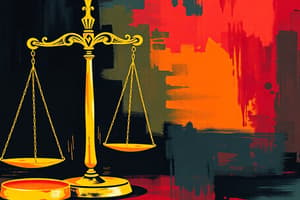Podcast
Questions and Answers
刑法主要关注哪些内容?
刑法主要关注哪些内容?
- 规范政府各部门之间的关系
- 处理犯罪和对社会政府的侵犯行为 (correct)
- 对个人或组织造成的伤害进行赔偿
- 对个人或组织之间的纠纷进行调解
民法主要处理什么?
民法主要处理什么?
- 探讨公民权利以及立法、行政和司法部门的权力
- 处理个人或组织之间的争端 (correct)
- 规范政府各部门之间的关系
- 处理犯罪行为
宪法法律主要规范什么?
宪法法律主要规范什么?
- 公民权利,以及立法、行政和司法部门的权力 (correct)
- 处理个人或组织之间的纠纷
- 政府各部门之间的关系
- 处理违反社会规范的行为
早期法律是如何产生的?
早期法律是如何产生的?
法律的重要性体现在哪些方面?
法律的重要性体现在哪些方面?
什么是‘合同法’所规范的内容?
什么是‘合同法’所规范的内容?
哪种法律系统以判例法为基础?
哪种法律系统以判例法为基础?
‘民法’由哪些地区发展而来?
‘民法’由哪些地区发展而来?
'侵权法'主要涉及哪些民事过错?
'侵权法'主要涉及哪些民事过错?
'刑事法'主要涉及哪方面?
'刑事法'主要涉及哪方面?
Study Notes
Law: A Framework for Order and Justice
Law is a fundamental part of our social fabric, guiding behavior and resolving conflicts. It's a set of rules and regulations that govern our interactions with others and with governments. Let's delve into the world of law, exploring its history, branches, and the diverse ways it shapes our lives.
The Evolution of Law
Law has been part of human societies since time immemorial. Early laws emerged as customs and traditions designed to resolve disputes within small communities. As societies grew more complex, so too did their legal systems. With the advent of writing, codified laws were born, and legal philosophy flourished. Today, law systems around the globe continue to evolve, adapting to the challenges of a rapidly changing world.
Branches of Law
Law can be divided into several main branches, each with its own unique focus:
- Criminal law: Concerns crimes and offenses against society and the government, and the legal punishments that can be imposed for such acts.
- Civil law: Deals with disputes between individuals or organizations, focusing on compensation for harm or violation of legal rights.
- Constitutional law: Governs the relationships among the branches of government, protecting the rights of citizens, and outlining the powers of legislative, executive, and judicial branches.
- Contract law: Regulates the formation, performance, and enforcement of contracts, providing a framework for individuals and businesses to enter into binding agreements.
- Property law: Concerns the rights and responsibilities related to the ownership, use, and transfer of property.
- Tort law: Deals with civil wrongs, such as negligence, intentional harm, and strict liability, and the legal remedies for such wrongs.
Legal Systems
There are two main legal systems in the world: common law and civil law.
- Common law: Originating from England, this system is based on judicial decisions rather than codified statutes. Case law forms the basis of common law, with each new case building upon the decisions of previous cases, resulting in a flexible legal system that adapts to changing circumstances and facts.
- Civil law: Developed in continental Europe, this legal system is based on codified statutes rather than case law. Civil law systems have centralized legal codes that cover specific areas of law. They are often more prescriptive and less flexible than common law systems.
The Role of Courts
Courts play a vital role in our legal systems. They resolve disputes through the application of law, act as a check on government power, and interpret legal statutes. Courts are also responsible for determining the facts of a case, applying the relevant law to those facts, and rendering a final verdict or judgment.
The Importance of Law
Law is essential for maintaining peace, order, and justice in our society. It provides a framework for individuals and organizations to interact with one another, establishes boundaries for acceptable behavior, and resolves disputes in a fair and just manner. Law also protects our rights and freedoms, ensuring that we live in a safe and secure environment.
In conclusion, law is a complex and diverse field that has a profound impact on our daily lives. Whether you're navigating the nuances of a contract or seeking justice in a courtroom, understanding the principles and practices of law can empower you to make informed decisions and advocate for your rights and those of others. Law, Cambridge Dictionary, https://dictionary.cambridge.org/dictionary/english/law Law, Legal Information Institute, https://www.law.cornell.edu/wex/law Law, European Commission, https://ec.europa.eu/info/law/law-topic_en Branches of Law, Legal Information Institute, https://www.law.cornell.edu/wex/branches_of_law Common Law vs. Civil Law, Legal Information Institute, https://www.law.cornell.edu/wex/common_law_vs_civil_law Courts, Legal Information Institute, https://www.law.cornell.edu/wex/courts The Importance of Law, Legal Information Institute, https://www.law.cornell.edu/wex/importance_of_law
Studying That Suits You
Use AI to generate personalized quizzes and flashcards to suit your learning preferences.
Description
Explore the evolution, branches, legal systems, and role of courts within the framework of law. Discover how law maintains peace, order, and justice in society while protecting rights and freedoms. Enhance your understanding of the diverse field of law and its profound impact on daily life.




